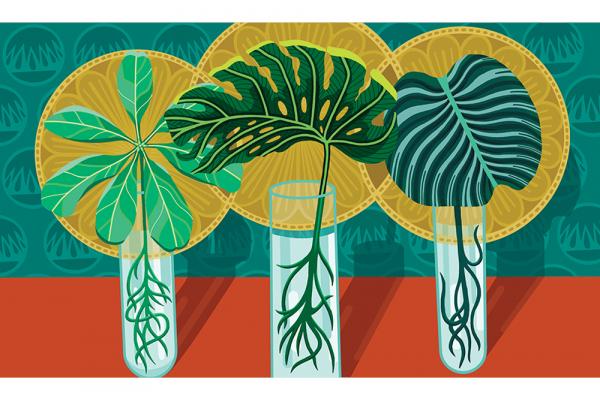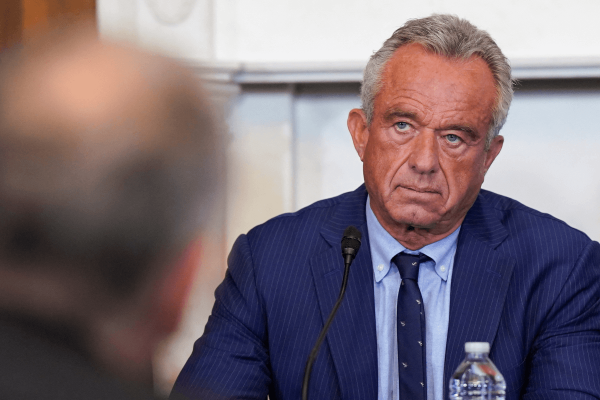BEFORE THE PANDEMIC hit, I could have told you the precise number of my indoor plants: zero. But then lockdown started and, like countless people around the world, I became obsessed with all things leafy and green. Once I learned how to keep a plant alive, I began to nurture cuttings. To see that first fresh leaf grow — an assurance that new roots had taken hold — filled me with a kind of joy heretofore unknown.
I needed to feel like life could not just survive, but flourish and thrive. “Give this at least six weeks before repotting,” I would text a friend from her porch as I dropped off the gift of a budding leafy monstera, “just to let the roots settle.” Then I’d trudge back to the sidewalk to watch my friend open her door, wave to me, and take this small extension of myself into her home. Months later, when we could visit in person, I’d get to see how much these little ones had grown. Great leafy extensions of love.
Most of the gospel readings this month contain horticultural parables — seeds and soil, wheat and weeds, sowers and reapers. Before the COVID-19 years, I had never read these parables through the eyes of someone who had nurtured plants to life. Their images had been abstractions, ideas, metaphors with no roots. But now that those seeds have grown, I see each one anew. Perhaps you do too?
July 2
Problems with Exile-Avoidance
Jeremiah 28:5-9; Psalm 89:1-4, 15-18; Romans 6:12-23; Matthew 10:40-42
IN TERMS OF prophetic showdowns, the one between Hananiah and Jeremiah starts out pretty tame. “Things are looking up,” Hananiah proclaims. “Gosh, I sure hope so!” responds Jeremiah (I’m paraphrasing, but you get the drift). “I mean, every true prophet forever has prophesied terrible stuff,” Jeremiah adds (verse 8). “But still, let’s try your thing. If everything turns out okay, we’ll know you were right.”
Hananiah wasn’t right. Judah was about to fall, and fall again, sending God’s people into Babylonian exile. In some ways, Hananiah’s prophecy seems merely the beginning of the end: a state that we can often feel we are living in these days too.
I am not sure that Hananiah was a false prophet, though, so much as one who just got it wrong — perhaps there is no difference. But still, his hope seems more misplaced than malicious. And for that reason, he offers a potent warning sign. How often does my desire for things to work keep me from engaging the reality before me? (When it comes to eco-catastrophe, certainly, but with many other pressing issues too.) How often does my misplaced hope lead others astray? Hananiah reminds me that sometimes trying to avoid exile is precisely what can land us there.
July 9
All That We Are
Zechariah 9:9-12; Psalm 145:8-14; Romans 7:15-25; Matthew 11:16-19, 25-30
REV. SMITH, THE pastor for the eponymous frontier town of HBO’s masterpiece Deadwood, is a fan favorite. He might be naïve and a real downer when he enters a brothel, but when smallpox hits the town and he drives himself to exhaustion nursing the sick, the community realizes that he practices what he preaches. So, it is devastating to the town and viewer alike when Smith gets a brain tumor. Afflicted by seizures, unable to hear God’s voice or recognize his friends, Smith eventually becomes delusional — and his death in the first season’s finale is one of the more poignant moments of the whole series.
David Milch, the show’s creator, describes his work with Deadwood as like an act of faith. So, when Smith preaches Paul’s “one body, many parts” passage from 1 Corinthians 12, viewers hear Milch’s vision for the Deadwood community’s struggles to survive together. And when Smith’s illness progresses, and he proclaims that nothing will separate him from the love of Christ (Romans 8:31-39), we feel his faith clinging tight to hope.
Viewers often miss Smith’s deathbed citation from Romans 7:15-25, though. His mind is so far gone that his words are almost indecipherable. He straddles the thin veil between this world and the world to come. His spiritual porousness recontextualizes Paul’s grappling — “I do not understand my own actions. For I do not do what I want, but I do the very thing I hate.” (verse 15) — as a metaphysical battle more than an ethical one. In this moment, the Reverend bears intimate witness to the tension between everything humans are and everything we can be by God’s grace. And for me, a passage often cited to demonstrate the extent of human sinfulness now always reverberates with the fullness of our salvation.
July 16
Tending Redemption
Isaiah 55:10-13; Psalm 65:1-13; Romans 8:1-11; Matthew 13:1-9, 18-23
“A SOWER WENT out to sow,” Jesus says in this week’s gospel, and I tune out — because I think I already know the story. Our youth group studied it so much to prepare for high school hallway evangelism that we reduced it to a technique. Don’t drop the seeds on the path; watch out for the birds; beware the rocks, the sun, and the thorns. Plant them right — right soil, right roots, right care to nurture — then the soul you save will save many more besides.
It wasn’t until I spent these COVID years tending plants that I discovered the missing question: Why does the sower sow in the first place? Sure, the sower wants grain, fruit and, by extension, sustenance. But the thing I have learned from my plants is that even when I do everything “right,” there’s still a mystery to the process. So now, with this parable, it is the vision of the seeds and saplings as the fruits of faith that comes to the fore. And if faith is always a gift from God — which it is — then the parable’s emphasis is not a technique for individual salvation, but an invitation to participate in God’s ongoing redemption of creation as a whole.
July 23
Last Things
Isaiah 44:6-8; Psalm 86:11-17; Romans 8:12-25; Matthew 13:24-30, 36-43
IN THIS MONTH'S second horticultural parable, Jesus likens the kingdom of heaven to a field of good seed into which weeds have been planted. The landowner, realizing that the weeds cannot be removed without uprooting the fragile wheat, lets the two grow together until harvest time — at which point the reapers are instructed to collect, bind, and burn the weeds before gathering the crops.
The eschatological implications of this parable are at its surface. Derived from the Greek eschatos (“last”), eschatology refers to Christian reflections on endings: the end of history, end of creation, end of life, and so on. Some theologians interpret these endings as primarily future-oriented. Others collapse them into the present day, noting that the end of all life is likelier to come about at our own human hands, not God’s. Most, however, hold a tension between the “already and not yet” of God’s kingdom. We can glimpse God’s transformation of creation through the power of God’s Spirit, but we cannot grasp it for our own.
It is easy to read this parable as addressing “evil ones” tossed into the flames at the end of the “harvest” time while the righteous endure. But I wonder if the field of mixed plants is also the field of our hearts. Martin Luther argued that we are “ simul justus et peccator” (“simultaneously justified and sinner”) — and, if Luther was right (which I believe he was), then this parable might be more a promise than a warning: a promise that God’s refining fire will burn away all our sin so we can be in God’s presence at the last.
July 30
Divinity Packed Down
1 Kings 3:5-12; Psalm 119:129-136; Romans 8:26-39; Matthew 13:31-33, 44-52
OUR THIRD HORTICULTURAL parable in Matthew’s gospel is both the most humble and the most mighty. “The kingdom of heaven is like a mustard seed,” Jesus tells his disciples. “It is the smallest of all the seeds, but when it has grown it is the greatest of shrubs and becomes a tree” (13:32). Whereas the earlier parable at the beginning of this chapter had birds stealing seeds from the path (13:1-9), here the birds nest in the branches: no longer a threat, but now friends.
We have taken a journey this month: from the stark reality of prophetic warnings to the porousness of reality, away from the individual toward the communal and back again in ever-spinning rotations. We have sought survival, but also flourishing. And here, we have come to the end to find a vision of God’s reign that is, in a sense, an image of its king. As with the mustard seed — the seed that contains whole worlds of possibility — the might of Divinity got packed down into the humility of humanity. And, as with the mustard seed, that might has emerged from humility, and will emerge again: already but not yet, among us and around us, in ways we can glimpse but not grasp, as we rest in and tend to its branches.

Got something to say about what you're reading? We value your feedback!






